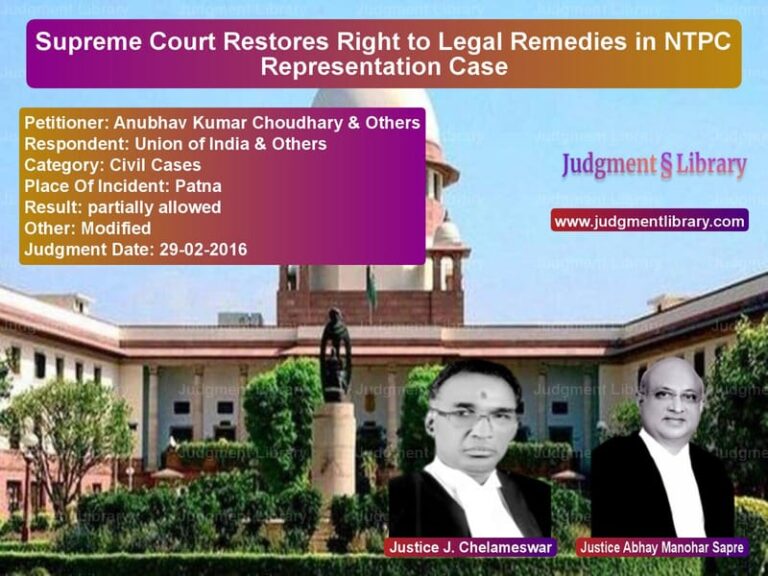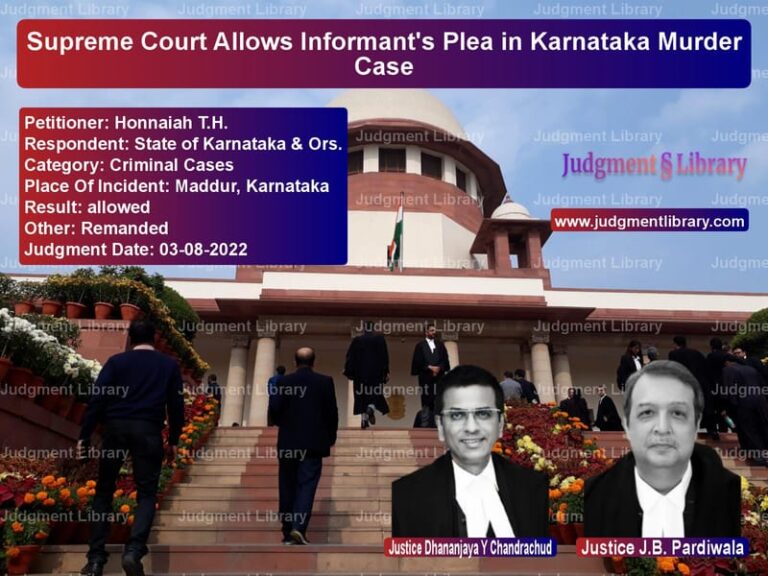Supreme Court Upholds Conviction in Rape Case: No Reopening of Judgment Due to Judge Transfer
The Supreme Court of India, in Harshad Gupta v. The State of Chhattisgarh, delivered a crucial ruling on October 1, 2024, upholding the conviction of the appellant and dismissing his plea to reopen the judgment due to the transfer of the trial judge. The Court held that once a conviction is pronounced under Section 235(1) of the Cr.P.C., the successor judge is only required to decide on the quantum of sentence and does not need to re-hear the case on conviction. This judgment clarifies an important aspect of criminal procedure and ensures continuity in judicial proceedings.
Background of the Case
The case arose from FIR No. 03/13 registered on May 28, 2013, at Police Station Jashpur, Chhattisgarh, under:
- Section 376 (Rape) of the Indian Penal Code (IPC)
- Section 506 (Criminal Intimidation) of the IPC
The appellant, Harshad Gupta, was the principal accused, and his father was also named in the case for allegedly threatening the victim to withdraw her complaint.
Trial and Conviction
The Trial Court conducted proceedings and, on April 30, 2015, convicted the appellant under Sections 376(1) and 506 of the IPC. However, before the sentence could be pronounced, the appellant moved an application under Section 317 of the Cr.P.C. seeking exemption from appearance, citing injuries from a road accident.
During this period, the Presiding Officer (Judge J.R. Banjara) who had convicted the appellant was transferred, and a new judge, Mohammad Rizwan Khan, took charge of the trial court.
Petitioner’s Arguments (Harshad Gupta)
The appellant, through his counsel, argued:
- Since the original trial judge was transferred before passing the sentence, the new judge should re-hear the case, including the conviction.
- The conviction judgment did not satisfy the requirements of Sections 353 and 354 of the Cr.P.C., making it invalid.
- The successor judge could not proceed with sentencing without independently evaluating the conviction.
- The principle of fair trial under Article 21 of the Constitution was violated as the accused was denied a fresh hearing.
Respondent’s Arguments (State of Chhattisgarh)
The State of Chhattisgarh, represented by its counsel, countered:
- The conviction was validly recorded on April 30, 2015, by the trial court.
- Under Section 235(1) of the Cr.P.C., once the judgment of conviction is delivered, the court becomes functus officio and cannot revisit the conviction.
- The new judge’s role was limited to deciding the quantum of sentence under Section 235(2).
- Allowing the plea would set a dangerous precedent, enabling convicts to exploit judicial transfers to delay justice.
Supreme Court’s Analysis and Judgment
Conviction Stands Once Pronounced
The Supreme Court rejected the appellant’s plea for re-hearing on conviction, stating:
“Once the judgment of conviction is delivered under Section 235(1) of the Cr.P.C., the trial court becomes functus officio for conviction matters. The successor judge is required only to determine the quantum of sentence.”
No Violation of Sections 353 and 354 Cr.P.C.
The appellant argued that his conviction judgment did not satisfy procedural requirements. However, the Court ruled:
“The conviction judgment was pronounced in open court in the presence of the accused’s counsel and satisfies all legal requirements under Sections 353 and 354 of the Cr.P.C.”
Function of the Successor Judge
The Supreme Court emphasized that the successor judge’s role was limited:
“The new Presiding Officer is bound to hear the accused on the quantum of sentence as per Section 235(2) of the Cr.P.C. but is not required to re-examine the conviction.”
Precedent Against Delays in Justice
The Court warned against setting a precedent that could allow convicted individuals to manipulate judicial transfers for undue delays.
“Accepting the appellant’s argument would create an unjust scenario where convicts could delay sentencing indefinitely by exploiting judicial transfers.”
Key Takeaways from the Judgment
- Conviction Finality: Once a trial court delivers a conviction, a successor judge does not need to re-hear the case.
- Continuity in Criminal Proceedings: Transfers of judges do not invalidate prior judgments.
- Preventing Legal Manipulation: The ruling prevents accused persons from delaying sentencing by seeking fresh hearings.
- Role of Successor Judge: The successor judge’s duty is limited to hearing the accused on sentencing.
Impact of the Judgment
The Supreme Court’s ruling will significantly impact the judicial process by:
- Ensuring swift justice without unnecessary delays.
- Preventing accused persons from challenging convictions merely due to judicial transfers.
- Providing clarity on the role of successor judges in criminal cases.
Conclusion
The Supreme Court’s decision in Harshad Gupta v. State of Chhattisgarh reinforces the principle that a conviction remains final once pronounced by the trial court, even if the presiding judge is transferred. By dismissing the appellant’s plea for re-hearing, the Court has ensured that judicial transfers do not disrupt the administration of justice. This ruling serves as a strong precedent against procedural delays and upholds the integrity of the criminal justice system.
Petitioner Name: Harshad Gupta.Respondent Name: The State of Chhattisgarh.Judgment By: Justice Surya Kant, Justice Ujjal Bhuyan.Place Of Incident: Jashpur, Chhattisgarh.Judgment Date: 01-10-2024.
Don’t miss out on the full details! Download the complete judgment in PDF format below and gain valuable insights instantly!
Download Judgment: harshad-gupta-vs-the-state-of-chhatti-supreme-court-of-india-judgment-dated-01-10-2024.pdf
Directly Download Judgment: Directly download this Judgment
See all petitions in Bail and Anticipatory Bail
See all petitions in Attempt to Murder Cases
See all petitions in Fraud and Forgery
See all petitions in Criminal Conspiracy
See all petitions in Extortion and Blackmail
See all petitions in Judgment by Surya Kant
See all petitions in Judgment by Ujjal Bhuyan
See all petitions in dismissed
See all petitions in supreme court of India judgments October 2024
See all petitions in 2024 judgments
See all posts in Criminal Cases Category
See all allowed petitions in Criminal Cases Category
See all Dismissed petitions in Criminal Cases Category
See all partially allowed petitions in Criminal Cases Category







